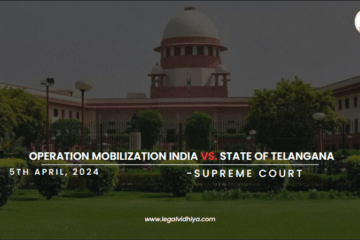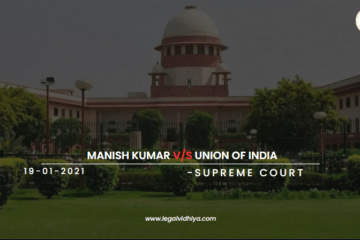
| CASE NAME | WILDLIFE FIRST AND OTHERS V. UNION OF INDIA |
| EQUIVALENT CITATION | 2019 SCC Online SC 238 |
| DATE OF JUDGEMENT | February 13, 2019 |
| COURT | Supreme Court of India |
| CASE NUMBER | Writ petitions (Civil) Nos. 109/ 2008 |
| CASE TYPE | Writ Petitions (Civil) |
| PETITIONER | Wildlife First and Others |
| RESPONDENT | Union of India |
| BENCH | Justice Arun Mishra, Justice Navin Sinha and Justice Indira Banerjee |
| REFERRED | Chapter II and Chapter III of the Scheduled Tribes and Other Traditional Forest Dwellers (Recognition of Forest Rights) Act, 2006. |
FACTS OF THE CASE
The forests form a natural and inherited part of the Earth, they are as a gift to us and hence people still dwell in those forests believing it to be their sanctity. The tribals have been living in the forests before independence it was the Indian Forests Act, 1927 and post-independence, it still did not improve: “a precarious state of tenurial insecurity”.
The factum goes like that after taking cognizance of this situation, National Forest Policy, 1988 was made and later on the Forest Rights Act in 2006 was introduced. Post its adoption, the Wildlife First Organization with Wildlife Trust of India and other organizations approached the Supreme Court with the plea of taking cognizance of the 2006 act as it was causing problems to the dwellers.
The 2006 Act requires the dwellers to prove their identities and to do so was a herculean task for them and this was made mandatory if they want to live and dwell in the forest and have a dignified life. This was seen as a calculated step by many of the petitioners in this case in order to save the forests from being exploited by unknown people or the impostors. The petition was filed in order to save the forest dwellers from this hardship and challenged the constitutional validity of Scheduled Tribes and Other Forest Dwellers (Recognition of Forest Rights) Act, 2006.
ISSUES
- Whether the Forest Rights Act, 2006 are violative of the Constitution of India, 1950?
- Whether the procedure adopted in the Act is constitutional?
- Whether the Act, 2006 is in the interest of our evergreen forests?
CONTENTIONS OF THE PETITIONERS
- The learned counsel on the behalf of petitioners argued that the Act, 2006 is in violation of article 14 and 21 of the Constitution of India, 1950.
- In addition, it was contended that Articles 48 and 51A(g) of the Indian Constitution, 1950 are also violative as the act provides for forest rights on protected areas other than reserved forests and it would be detrimental to the protected areas network[1].
- It was also contended that the act goes in violation of the sustainable development and causes threat to the ecological and environmental security of the nation.[2]
- Further it has been argued that the Parliament lacks the potential and is incompetent to enact the 2006 act since its pith and substance related to rights in and over land as it creates tenural rights on forest lands.[3]
CONTENTIONS OF THE RESPONDENT
- The learned counsels of the States concerned were required to submit the affidavit as was ordered by the court as it concerned the case of tribals. Hence the affidavits were filed.
- The affidavits were ordered to be made and the states had complied with it and h had presented the same in front of the court.
RATIO DECIDENDI
The order was delivered unanimously by the respected judges, Justice Arun Mishra, Justice Navin Sinha and Justice Indira Banerjee,
JUDGEMENT
The Supreme Court of India considered the petitions filed and was considered it as a matter that needs time and energy of the States as well as the authorities in order to preserve the rights of the tribals. The State of Andhra Pradesh was ordered to file an affidavit stating the reasons of its non- compliance with the orders of eviction and the rejections of the claims. The same was ordered for the State of the Assam directing its Chief Secretary. In Bihar, the claims were taken into consideration and hence they were also ordered to do file a full closed affidavit. The same was held in the case of State of Chhattisgarh, Goa, Gujarat, Himachal Pradesh, Jharkhand, Karnataka, Kerela, Madhya Pradesh, Maharashtra, Orrisa, Rajasthan, Tamil Nadu, Uttar Pradesh, Telangana, Tripura, Uttarakhand, West Bengal, Manipur.
It was further directed by the apex court that the States wherein the verification, reverification or the review process was pending, it should do the same within the time stipulated and submit the required full close report to the Court. The satellite survey was also directed to be done by the Forest Survey of India and a detailed report on encroachment positions as well as the situation and position post the eviction.
The matter was ordered to be listed on 24.07.2019.
CONCLUSION
The matter concerned relates to tribal people of our country and they make the 20 to 30 percent population of the country. These people too deserve the right to have a settled life wherever they want to. The forests are the natural sources and for ages they have been dwelling place of these tribals. They work, eat and sleep in these forests and who would know better than them about these forests. The Forest Act, 2016 was brought by the Union Legislature for giving effect to certain things that were of paramount importance but it was held to be violating the rights of the tribals which cannot be ignored. Hence the laws and acts should be made keeping in mind the situation of every citizen and that no individual should be forced to live in a compromising situation.
[1] Writ Petition, Wildlife First V. Union of India, CJP, https://cjp.org.in/writ-petition-wildlife-first-vs-union-of-india/#:~:text=In%202008%2C%20Wildlife%20First%20along,%2C%202006%20(the%20FRA). , last seen on 15/04/ 2023.
[2] Ibid.
[3] Ibid.
This is written by Shriyanshi of Amity Law School, Lucknow, an intern under Legal Vidhiya




0 Comments